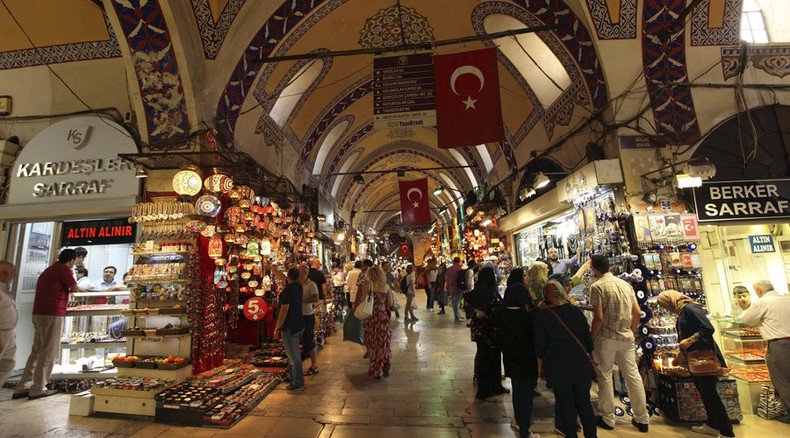Russian businesses boycott Turkey over jet incident

Russia’s largest tour operators are terminating their business with Turkey in response to the Kremlin's travel warning to the country in the aftermath of the downing of a Russian warplane.
Major operators Pegas Touristik, Natalie Tours, Biblio Globus and Tez Tour have announced they are ending package holidays to Turkey.
Russian Foreign Minister Sergey Lavrov canceled his visit to Istanbul over the jet incident and recommended Russians not visit Turkey in the near future.
The boycott could be a serious blow to Turkey's tourism industry. Turkey is one of the favorite and main tourist destinations for Russians. More than three million tourists from Russia visited the country last year, with over one million holiday makers in the first half of 2015.
The tourism industry accounts for 11 percent of Turkey's GDP, or $170 billion. The disruption of flights from Russia could cost Turkey about $30 billion a year, according to analysts.
President Putin warned Ankara on Tuesday that the downing of the Russian warplane will have grave consequences for Russia’s relations with Turkey. Most experts expect Moscow's response to be economic.
Russia-Turkey annual trade could reach $100bn http://t.co/WelBuNPXWbpic.twitter.com/GdKli6vPLJ
— RT (@RT_com) October 19, 2015
The latest events could bring considerable damage to the Turkish economy, said Vice President of the Center for Strategic Communications Dmitry Abzalov.
"Right now, relations between Moscow and Ankara are tense. Primarily it concerns the transportation of energy and nuclear power, and other sectors as well," Abzalov told the Prime Agency.
The construction of Turkey's first nuclear power plant at Akkuyu by Russia’s Rosatom could be hit the hardest, according to analysts. Russia and Turkey signed an agreement on the $20 billion project four years ago. The nuclear power plant with a 4800 megawatt capacity could allow Ankara to reduce the cost of power generation and energy. The country is interested in developing its own generating capacity.
Turkey ready to settle deals with Russia in local currencies - ruble and lira http://t.co/hPRXSkZgIgpic.twitter.com/86QNxDlhYo
— RT (@RT_com) March 30, 2015
Another major project for the two countries is the Turkish Stream pipeline which aims to deliver Russian natural gas to Turkey via the Black Sea. The construction of the pipeline which was scheduled to begin in June was delayed as the two countries failed to reach an intergovernmental agreement. It could possibly be frozen now, according to experts.
On Wednesday, Russia's food safety regulator Rosselkhoznadzor stopped a 162 ton shipment of chicken from Turkey for not having proper food safety certificates.
Trade between Russia and Turkey was over $30 billion at the end of 2014. Last month Russian Deputy Foreign Minister Alexei Meshkov said trade could reach $100 billion with the help of joint projects.
Turkey is one of the most important suppliers of fruits and vegetables to Russia, and its role in the Russian market has increased since Moscow’s introduction of the food embargo on EU countries. The loss of this market will be significant for Ankara, experts say.
Turkey aims for $100bn trade with Russia by 2023 – Erdogan http://t.co/EHsQz1P4nIpic.twitter.com/7mmfMbJXD5
— RT (@RT_com) September 26, 2015
"There are a lot of Turkish companies operating in the construction business in the Russian market; there is cooperation in the tourism sector. The termination of relations with Moscow on these issues will be negative for the Turkish economy, and it will hit the national currency the lira," Abzalov said.
A Russian Su-24 bomber was shot down on Tuesday by Turkish fighter jets near the Turkish-Syrian border. Turkey claims that the plane violated Turkish airspace and did not respond to warnings. Russia insists that the plane remained in Syrian airspace.












